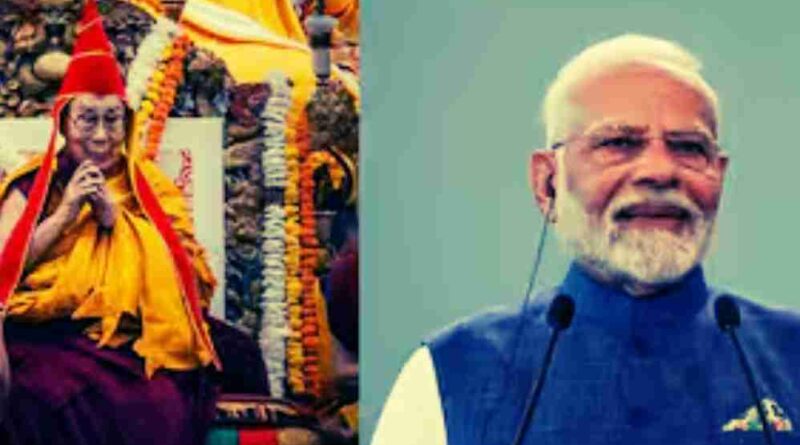China Objects to PM Modi’s Birthday Wishes to Dalai Lama, Straining Diplomatic Ties
In a diplomatic move that has stirred fresh tension between two of Asia’s largest powers, China has formally lodged a protest with India after Indian Prime Minister Narendra Modi extended birthday greetings to the Tibetan spiritual leader, the Dalai Lama. The greeting, delivered publicly on the revered monk’s 90th birthday, has once again spotlighted the sensitive and deeply rooted differences between New Delhi and Beijing over Tibet.
A Gesture of Respect, or a Political Signal?
Prime Minister Modi’s message to the Dalai Lama was warm and respectful, as he wished the spiritual leader a healthy and long life. Though brief and in line with past greetings he has sent, this year’s message has taken on heightened political significance, especially against the backdrop of ongoing geopolitical tensions between the two countries.
To many in India, the Prime Minister’s words are a mark of respect for a globally admired figure who has lived in exile in India for over six decades. But for China, which considers the Dalai Lama a separatist and a threat to its control over Tibet, the move has been viewed as a deliberate provocation.
Chinese officials responded swiftly, voicing “strong dissatisfaction and firm opposition” to what they described as India’s interference in its internal affairs. According to China, any official interaction with the Dalai Lama—however symbolic—is seen as undermining its sovereignty.
The Tibet Tangle
The Dalai Lama fled to India in 1959 following a failed uprising against Chinese rule in Tibet. Since then, he has lived in Dharamshala, Himachal Pradesh, where he leads the Tibetan government-in-exile. India, while providing him asylum, has officially recognized Tibet as a part of China—a delicate balance that successive Indian governments have tried to maintain.
However, every birthday greeting to the Dalai Lama from Indian leadership is inevitably interpreted in Beijing as a diplomatic signal. While New Delhi views such interactions as expressions of humanitarian goodwill and cultural respect, China sees them through the lens of territorial integrity and political control.
This year’s protest appears particularly sharp. Analysts suggest that the escalating friction could be tied to larger regional dynamics—ranging from border disputes in eastern Ladakh to growing military alignments between India and Western powers. In that context, the Dalai Lama’s birthday becomes more than just a spiritual celebration—it becomes a geopolitical flashpoint.
A Silent Message in a Polite Greeting?
Observers believe Prime Minister Modi’s gesture may have been more than ceremonial. In the face of ongoing Chinese assertiveness along the Line of Actual Control (LAC), India has been recalibrating its diplomatic tone. By acknowledging the Dalai Lama publicly, Modi may be signaling that India is not afraid to assert its own values, even when they diverge from Beijing’s sensitivities.
The Dalai Lama remains a symbol of nonviolence, compassion, and spiritual wisdom to millions around the world. But to the Chinese Communist Party, he represents a challenge to its grip on a region it considers inseparable from the Chinese nation. This contradiction makes every mention of his name on the global stage a potentially incendiary act in the eyes of Beijing.
What’s Next?
India has not officially responded to China’s protest, and it’s unlikely that New Delhi will issue a public apology or clarification. Instead, Indian officials have often reiterated that the Dalai Lama is a guest in India, free to live and speak as he wishes.
The latest incident is unlikely to derail India-China relations entirely, but it does serve as a reminder of how fragile diplomatic etiquette becomes when national identities, territorial integrity, and spiritual symbolism collide.
With Tibet’s future still unresolved, and the Dalai Lama’s succession being an ever-looming question, moments like these will continue to test the tightrope both countries walk. Whether Modi’s birthday wish was a political chess move or a gesture of genuine warmth, the ripples it caused are real—and they speak volumes about the complexities of India-China relations today.
Disclaimer
The information and content shared on digitalgithub.com — including articles, blogs, news, guides, and other resources — is intended for general informational and educational purposes only. We do not guarantee the completeness, reliability, or suitability of any information. Always seek the guidance of a qualified professional before making decisions based on the information you read. Use this site at your own risk.

